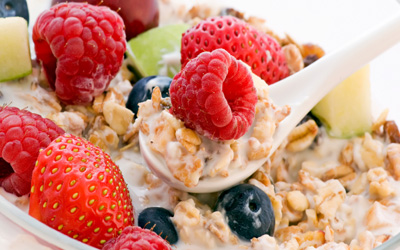



Almost half of the respondents to a recent Student Health 101 survey said they make the effort to eat breakfast every day. And according to the old adage, “Breakfast is the most important meal of the day,” these students are on the right track.
But do you know why breakfast is so important? Read on to learn the reasons and how to make the most of your first meal of the day.
Everything can feel a little fuzzy and difficult if you haven’t eaten breakfast. Cindy Atkins, the director of dining services at St. Lawrence University in Canton, New York, says, “When students eat breakfast they are more alert and do better with their studies.”
A 2006 study at Saint Martin’s University in Lacey, Washington, gave a series of short-term memory quizzes to two groups of students: some who had eaten breakfast and some who hadn’t. The students were asked to memorize a word list, three sets of faces, and one set of random objects. The students who hadn’t eaten scored far lower than those who had, that is, until the non-eaters consumed food and their scores dramatically improved. As the study states, “Deprivation of a meal leads to dysfunctional states of the mind and physical self, such as loss of short-term memory and delayed reaction times.”
Why is this true? Your brain needs calories in order to function. John Z., a senior studying public health at Rutgers University in Newark, New Jersey, works in a biochemistry lab and is very familiar with the impact of nutrition on capabilities. As he explains, “Your brain consumes 20 percent of your daily calories. That’s pretty significant for one organ. So being malnourished affects first cognition, and secondly, [the rest of] your body.”

In a recent study looking at students’ breakfast-eating habits, stress levels, and ability to handle problems, San Francisco State University researchers found that students who skipped breakfast felt less capable of problem solving than students who had eaten soon after starting their days. “Stress levels were related to breakfast consumption patterns over time,” the researchers noted.
But the power of breakfast isn’t only studied in science labs. Students can easily see the difference in the lab of life, too. Gabbie L., a senior at Saint Peter’s University in Jersey City, New Jersey, notes, “The biggest difference I notice is that I’m not as cranky and I’m a little more patient and organized with my thoughts [when I eat breakfast]. I’m also not distracted by my stomach growling during class.”
In the rush of the morning, it might seem like breakfast takes too long to make or is awkward to eat in your dorm room or car. “Breakfast wasn’t my priority,” says Gabbie. “Getting to class on time and getting enough sleep to tide me over for the morning was the priority.” But after she realized how much better she felt if she ate, rather than hitting snooze, Gabbie traded in the extra fifteen minutes of sleep for some toast and eggs.
Breakfast doesn’t have to be an enormous time commitment. In fact, most students spend between 5 and 10 minutes preparing breakfast for themselves. Some study, read the news, or get ready for the day while they eat. “I’ll do my homework or watch TV while eating,” says Allison M., a senior at the University of Michigan-Flint.

You only need a few simple ingredients to put together a healthy morning meal, and although storage and other appliances might be limited, breakfast foods are often simple to keep on hand. Atkins says, “I usually suggest that students have cereal bars, cold cereal, or oatmeal packets that they can cook in their rooms, fresh fruit or juice, and that they have a protein source at this meal.”
John agrees. “You should eat a balanced meal every time you eat: Whole-grain carbohydrates, some type of plant-a fruit or vegetable-and low-fat protein,” he says. “When you eat refined carbohydrates, it promotes serotonin synthesis and a sense of well-being, but it also promotes sleepiness. You can combat that by eating lean protein along with carbs.”
What about if you’re eating at the dining hall or elsewhere on the go? Maybe you feel like healthy options aren’t available, so you skip breakfast altogether. If you look carefully, though, you’re likely to find some good foods.
“We include quinoa on our breakfast menu,” says Bryan Varin, associate director of meal plan operations at the University of Georgia in Athens. “We cook our quinoa in soy milk and offer healthy toppings such as dried fruits, nuts, and Greek yogurt. We always have a selection of fresh fruits, healthy cereals, and a lean meat such as chicken sausage links.”
Plus, as Varin points out, “We handle all of the cooking and wash all of the dishes, too!” There’s nothing for you to do but throw out your trash and walk out the door.
So whether you’re eating at home or on the go, take a few minutes for breakfast. Your brain and body will thank you by working their best.
Rosemarie is studying communications at Saint Peter’s University in New Jersey.
Allison M., a senior at the University of Michigan-Flint, starts her day in her apartment and then commutes to school. Here are her easy breakfast ideas:
Also try:
Even if you’re really in a hurry, grab something like a granola or nut and fruit bar. Look for those with 200-300 calories that are low in sugar, high in fiber, and made from as many whole ingredients as possible.
Here are some healthy foods to seek out when you’re on the go:
Remember, you can always get a few things á la carte and put them together as a custom meal.




